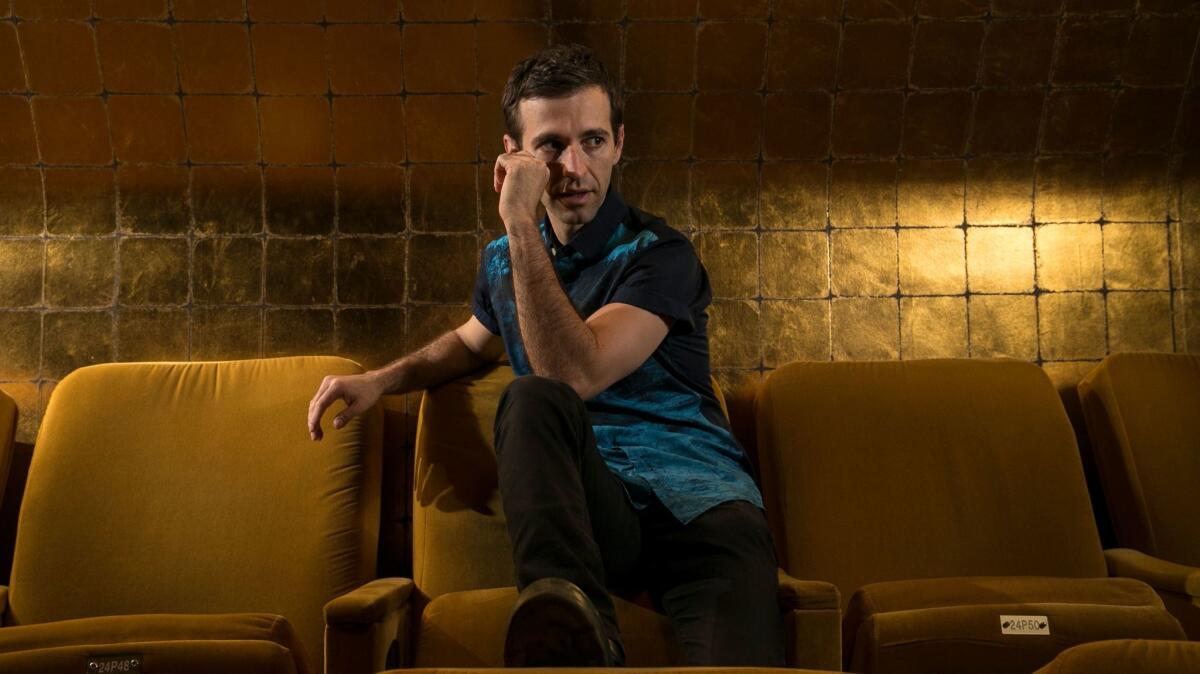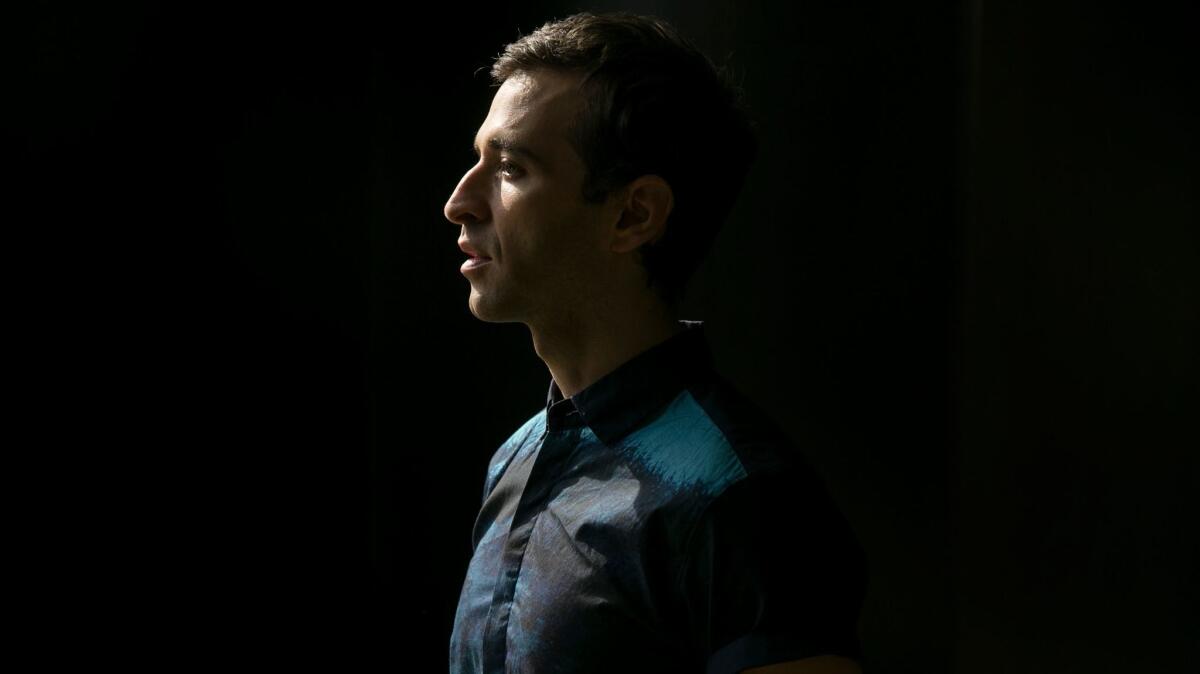The falsetto pharaoh: The story behind the powerfully high voice in L.A. Opera’s ‘Akhnaten’

- Share via
When he was 11, Anthony Roth Costanzo already was a working Broadway actor. He sang in his first opera when he was 13. Since graduating from Princeton and the Manhattan School of Music, he has been a rising star in the opera world.
Now, at 34, he is singing his biggest, most demanding role yet: Akhnaten, the revolutionary pharaoh in ancient Egypt and the title character in the minimalist opera that Philip Glass composed in 1983, when Costanzo was an infant.
For the record:
10:12 p.m. Jan. 25, 2025An earlier version of this article included a reference to a Saturday performance, referring to a Nov. 5 show. But the article was published after that performance.
That is partly because the role of Akhnaten is for a countertenor, which means that Costanzo sings with a powerful, highly controlled falsetto. His vocal range matches that of a traditional mezzo-soprano.
Costanzo sang “Akhnaten” in the world premiere of director Phelim McDermott’s production in March at the English National Opera in London. This month, Costanzo and McDermott bring “Akhnaten” to the Los Angeles Opera stage for its U.S. premiere, where the audience will include not only Glass but also Costanzo’s childhood mentor, filmmaker James Ivory, who directed Costanzo in the 1998 Merchant Ivory movie “A Solider’s Daughter Never Cries.”
Costanzo says this latest role is demanding vocally, dramatically and physically. “It uses all the resources that I feel I’ve been working on for my whole 23 years of professional performance,” he says, later adding: “It goes beyond athletic to Olympic. It feels like it is at the edge of possibility.”
Costanzo likes to point out that, although the countertenor voice sounds exotic to many first-time listeners, what he is doing is not terribly different from what Michael Jackson, Prince and Justin Timberlake all have done to sing the high notes.
Mezzo-soprano J’Nai Bridges plays Nefertiti, the queen to Costanzo’s king. She says she enjoys singing opposite him because their voices are so similar, and they share the same vocal sweet spots. In a twist from her usual roles, she sometimes sings lower than her male counterpart.
“Anthony has always been so extremely motivated, dedicated, consistent and hard-working,” she says of Costanzo, whom she’s known for more than a decade. “To see where that has taken him professionally has been inspiring.”
As a countertenor, Costanzo says the roles available to him exist “at two ends of the spectrum: before 1750 and after 1950.” That excludes him from the Puccini, Verdi and Wagner that dominate many opera companies’ programming.
“I really do think that Philip Glass writing ‘Akhnaten’ in the early 1980s for a countertenor was incredibly revolutionary,” Costanzo says. “He was, as he often is, totally ahead of the game.”
Today, more composers are eager to exploit the added color a countertenor voice brings to their compositional palettes. In 2015, Costanzo sang in two world premieres of major new American operas: Jake Heggie’s “Great Scott” at the Dallas Opera, and Jimmy López’s “Bel Canto” at the Lyric Opera of Chicago.
Keith Cerny, chief executive and general director of the Dallas Opera, attributes Costanzo’s success partly to his vocal production and a stage presence that make audiences comfortable with him. Cerny calls Costanzo “the complete package as a singer, an actor and a very media savvy professional,” adding that “composers are also lining up to write for him because of these same qualities.”
On stage, Costanzo seems to thrive when handed a dramatic challenge. He enjoys delving into the depths of Akhnaten’s psyche.
“Is Akhnaten good or bad? Is he a cult leader or a spiritual guru? There are many layers of complexity,” he says. “And character is so important to me.”

Because Glass’ “Akhnaten” is so intensely abstract and otherworldly, McDermott’s production requires what Costanzo calls “a different style of performance and complete devotion.”
It also requires nudity. Which is why Costanzo has been following a strict diet and working with fitness trainer and Bravo reality TV star Craig Ramsay three times a week.
McDermott also asked Costanzo to shave his head and remove all the hair from his body for the role.
“Behold the #BOYZILIAN portion of the six hours of SUGARING,” Costanzo captioned an Instagram video last week during a full-body hair removal session at Sugar Me Beverly Hills.
The video is painful to watch, and it is just a glimpse into the effort Costanzo has poured into this role.
“It is a major transformation,” he says of his physical metamorphosis, “but it feels really parallel to what this role has been professionally and artistically for me. And that feels very satisfying.”
------------
Los Angeles Opera’s “Akhnaten”
Where: Dorothy Chandler Pavilion, 135 N. Grand Ave., L.A.
When: 7:30 p.m. Nov. 10, 17 and 19; 2 p.m. Nov. 13 and 27
Tickets: $19 and up (subject to change)
Information: (213) 972-8001, LAOpera.org
Follow The Times’ arts team @culturemonster.
ALSO
Dudamel brings his YOLA youth symphony’s spirit, and message, to Oakland
Why music from 1594 still moves us in 2016: The deep meaning of ‘Tears of St. Peter’
WikiLeaks at the Opera: What Chelsea Manning-inspired music says about government secrets
More to Read
The biggest entertainment stories
Get our big stories about Hollywood, film, television, music, arts, culture and more right in your inbox as soon as they publish.
You may occasionally receive promotional content from the Los Angeles Times.










